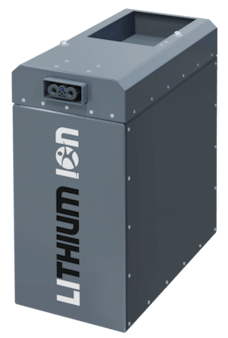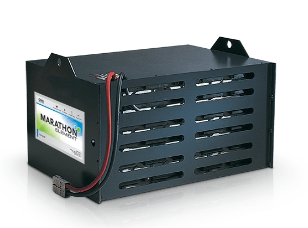
When you rely on electric forklifts to run your business, the industrial batteries you select to power your fleet affect your team’s productivity. There are many shapes, sizes, and types of forklift batteries. Each kind offers unique benefits, such as reduced charging time, longer run times, decreased maintenance, or a lower price point.
One important factor to consider is whether the battery is sealed or unsealed. If a battery is not completely sealed, it will require additional maintenance, such as watering, to ensure proper evaporation of the sulfuric acid. Watering ensures safe and optimal operation for unsealed batteries. If a battery is fully sealed, then watering is not required and maintenance is minimal. So which option is the best for supporting the electric forklifts in your warehouse, distribution center, or factory? Read on to learn about the common forklift battery types and the benefits that come with newer varieties like the lithium-ion battery.
Lead-Acid Battery
The most common type of battery used in forklifts is lead acid. Consisting of cases, cables, and cells that contain water and sulfuric acid, this battery operates by suspending electrolytes between two oppositely charged plates in the acid-water mixture. During the charging and handling process, evaporation occurs with the water and acid. These batteries often need more maintenance than other electric forklift batteries to maintain optimal performance. In the case of unsealed lead-acid batteries, workers must add just the right amount of distilled water to ensure the proper electrolyte levels. As a result, businesses may opt to purchase a unique system such as a single point watering system (SPWS) to make the process of keeping water at the appropriate levels easier and more efficient.
Flooded Lead-Acid or Wet-Cell Battery
The wet-cell battery is a type of lead-acid battery that was invented in 1836. These batteries can contain a mixture of distilled and sulfuric acid within the cases. Also called a "flooded" battery, the wet-cell battery comes in rechargeable and non-rechargeable versions. Wet-cell batteries release gas as the unit discharges. You must use special care to ensure they have the appropriate level of water to remain in working condition.
Gel-Cell Lead Acid Battery
Gel-cell batteries are a lead-acid variation that do not require as much maintenance as wet-cell batteries. They differ in that silica is added to the electrolytes, protecting them with a gel-like substance. Because of the thick gel, operators can install these batteries in a wide range of positions on the forklift. Plus, these batteries do not emit heavy fumes like other options, making them an excellent choice for enclosed spaces like warehouses. All gel-cell batteries come sealed and since you cannot open the casing, installing a special watering system is unnecessary. However, gel-cell batteries have slower charging cycles and should be removed from the charger as soon as ready. Being left on the charger too long can cause an irreversible void in the electrolytes, rendering it permanently damaged.
Key Lead-Acid Battery Benefits
-
Less expensive than other batteries
-
Has a longer lifespan in certain applications
-
Contains a higher discharge rate capability
-
Offers better compatibility and versatility
-
Can last about five years with proper maintenance
- Requires simple maintenance
Absorbed Glass Mat (AGM) Battery
Absorbed glass mat (AGM) batteries are variants of lead-acid types. In these batteries, a single electrolyte is stored in the glass mat, meaning there is no need to worry about spills. The glass mat allows the electrolyte solution to pass between the positive and negative battery plates. The mat will transfer the electrolytes to the plates when the battery is engaged. This option is still considered a sealed lead-acid battery. Even if the battery happens to tip over, the glass mat contains enough electrolyte solution to give the battery a full charge. These deep-cycle batteries are used in a wide range of applications, such as extreme weather and cold storage.
Key AGM Battery Benefits
-
Requires minimal maintenance and no watering
-
No risk of spilling water or acid
-
Charges more quickly than flooded acid batteries, depending on the start rate of the associated charger
-
Can withstand vibrations and heavy impacts
 Lithium-Ion Battery
Lithium-Ion Battery
While they are a newer technology for powering forklifts, lithium-ion batteries are becoming increasingly popular. These batteries have cathode and anode current collectors, a separator, and an electrolyte. Lithium ions move from the positive to the negative collector within the battery, depending on whether the unit is discharging or charging. They are more expensive than commonly used batteries, but their newer technology can reduce long-term costs, and prices are gradually declining. Unlike other batteries, these lithium forklift batteries do not need to be cleaned or sealed, giving employees more time to focus on other tasks. In the case of some smaller class 3 units, operators can plug these batteries into 110V/wall outlets and let them recharge.
Key Lithium-Ion Battery Benefits
-
Requires a shorter charging time
-
Has a higher energy density
-
More compact and lightweight
- It’s important to remember that counterweight minimums may call for the addition of steel as a ballast when using lighter batteries. The battery is “lighter” but in most instances due to counterweight minimums, steel has to be added for ballast.
-
Higher/faster charge rates allow for longer periods of use with the same amount of charge time
- Has a longer life expectancy than some other options
Which Forklift Battery to Choose?
It's important to understand that each type of electric forklift battery offers different advantages. You'll need to determine which advantages fit best for your unique business application and budget before making a purchase. Lead-acid and absorbed glass mat batteries are great options for businesses with tighter budgets or in extreme climate conditions. In contrast, lithium-ion batteries offer increased uptime and better long-term savings. Consider your current and future business needs to choose the ideal solution for your changing requirements.
Need More Information on These Batteries?
With all the options for electric forklift batteries, it can be challenging to know which ones will be the right fit for your business. Our team can help you make that decision. And if you're wondering whether your business is in the right place to try lithium-ion batteries, we can help you make the transition. To learn more about electric forklift batteries and emerging lithium-ion technology, talk to one of our expert consultants at 888.EQDEPOT.



